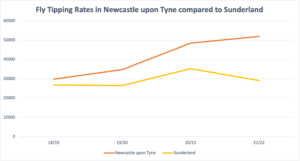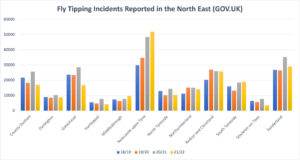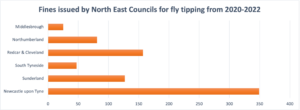Less than 1% of North East fly-tippers fined as dumping surges past pre-pandemic levels
Written by Kayleigh Beth Fraser on 9th May 2023
ONLY 1% of fly-tippers in the North East received fines from 2019 to 2022, as reports of the crime surged above pre-pandemic levels, Spark Sunderland can reveal.
Data obtained from Freedom of Information (FOI) requests and the government website, gov.uk, show that fly-tipping across the region is now higher than it was in 2019, with the number of reports in 2021-22 totalling over 210,000 – up from 190,000.
However, the data also shows that less than 1% of fly-tippers were fined, as the region saw just over 840,000 reports of the crime from 2018 to 2022.

Fly-tipping blights our region, but is on the rise because the risk of being caught is low.
Image: Pixabay
Spark Sunderland sent FOI requests to the following authorities:
- Sunderland City Council
- Newcastle City Council
- South Tyneside Council
- Redcar & Cleveland Borough Council
- Northumberland County Council
- Middlesbrough Council
- Gateshead Council
- Darlington Borough Council
- Durham County Council
- Hartlepool Borough Council
- Stockton-on-Tees Borough Council
Of those, Gateshead, Darlington, Durham, Hartlepool and Stockton councils did not respond.
Statistics from gov.uk revealed that Sunderland City Council received 29,046 reports of fly-tipping in 2021/22, up from 26,799 2018/19.
The city is second only to Newcastle, which received 51,945 reports in 2021-22, up from 29,793 in 2018/19.
The council put its extremely high fly-tipping rate down to its “large geographical area”.
A Sunderland City Council spokesperson said: “We have adopted an ‘eyes-wide-open’ approach, where all council staff are encouraged to report fly-tipping via an online reporting app, which may be a contributing factor to the increased number of reports, and means we may receive multiple reports of a single incident.
“Sunderland City Council may also receive a higher number of fly-tipping reports because Sunderland is a larger geographical area than some other councils in our region and more incidents will fall within the city’s boundaries.”

Fly tipping rates in Newcastle upon Tyne compared to Sunderland. (Data: GOV.UK)
In the rest of the region, fly-tipping reports have also soared above pre-pandemic levels, as incidents involve culprits dumping anything from a car boot to a lorry-load of waste in public spaces.
Data shows that Newcastle, Sunderland, South Tyneside, Northumberland, and Middlesbrough all received higher reports of the offence than they did before the Covid-19 pandemic.

Data shows the number of fly tipping reports to councils from 2018 to 2022. (Data: GOV.UK)
Government admits ‘more to do’ to tackle illegal tipping
Whilst fly-tipping offences are matters for local authorities, the national government can provide extra funds to councils on a range of issues including fly-tipping.
To understand more about their plans, Spark contacted the Department for the Environment, Food and Rural Affairs (Defra), which said there is “more to do” about the crime.
A Defra spokesperson said: “We are making solid progress on tackling fly-tipping – with incidents down 4% and fixed penalty notices up 58% over the past year – and anyone caught doing this can already face up to five years in prison and an unlimited fine if convicted in a crown court.
“We recognise, however, there is more to do. That’s why we’re supporting local authorities through £775,000 in new grants for innovative projects cracking down on waste crime, whilst our Anti-Social Behaviour Action Plan sets out how we will help councils to take even tougher action against those who harm our public spaces – including significantly raising the upper limit on fixed penalty notices to £1,000.”
One local authority benefiting from this extra funding is Durham County Council, which last year installed educational bin stickers, signage and set up CCTV cameras to deter fly-tipping.
Since then, fly-tipping reports have decreased from 25,667 in 2020-2021 to 17,106 in 2021-2022, making it one area in the North East where fly-tipping has decreased.
However, in spite of the Government’s investment in local councils, the number of fly-tipping fines being issued accounts for only 1% of reports in our region.
For example, data obtained by Spark shows that despite more than 10,000 reports in South Tyneside from 2020 to 2022, only 47 fines and 41 prosecutions were handed out during the period.

FOI data displays the amount of fines issued by councils from 2020 to 2022.
A similarly low rate was revealed in Northumberland, which said its fines for fly-tipping to date in that same period sat at just 81, during which it also launched 17 prosecutions.
Low risk of being caught ‘is encouraging fly-tippers’
The low risk of prosecution is encouraging fly-tippers, says anti-littering charity CleanupUK.
It says “public ignorance” of fly-tipping laws, as well as a low risk of being prosecuted, is the reason for the large number of incidents across the North East.
A spokesperson said: “Fly-tipping continues to be a problem throughout England and costly to clean up. It varies around the country, but prosecutions are, indeed, relatively few compared to offences, which is mainly due to the difficulty of identifying perpetrators.
“The reasons for fly-tipping are the well-known ones of a) the cost of legal disposal b) crimes where disposal is charged for but waste is then illegally dumped c) issues about waste disposal facilities/location/opening times/convenience/restrictions on materials (commercial waste).
“To a large extent there’s also public ignorance of the waste laws, alongside low risk of prosecution.”
The spokesperson added: “CleanupUK would hope to see all the above addressed but, unfortunately, Defra’s and the Environment Agency’s budgets don’t allow for the concerted effort required.
“There have been campaigns warning the public against disposing of rubbish via an unregistered ‘man and a van’ but we need far more awareness that this is illegal.”







